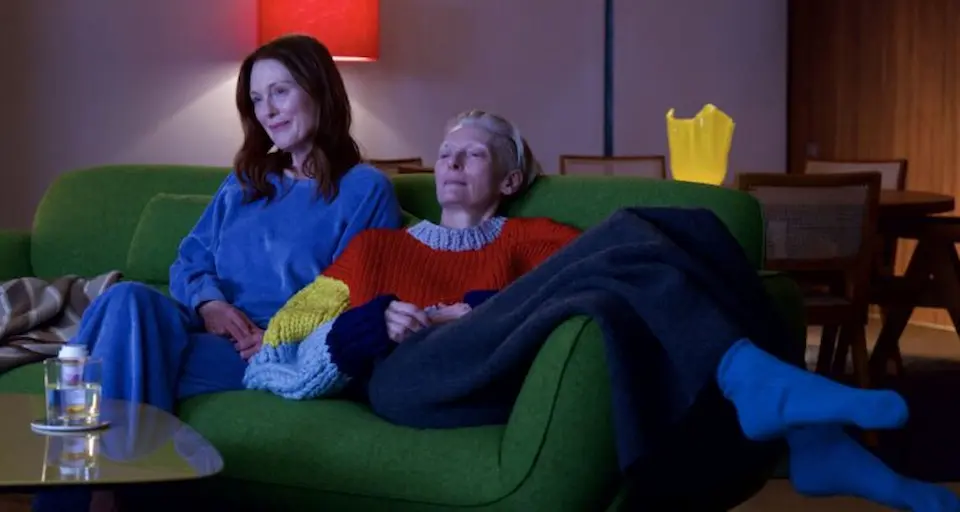“The Room Next Door”: A Dramatic Ode to Progressivism
Starring Tilda Swinton and Julianne Moore, the new film by Spanish director Pedro Almodóvar tells the story of two friends facing an imminent death.

Summary
Ingrid and Martha were close friends during their youth, when they worked for the same magazine. After years of being out of touch, they reconnect under sad circumstances: Martha has a terminal illness and does not have much time left.
Evaluating her options, Martha asks her friend for help to stop her suffering by keeping her company, and assisting her during her last days.
The Reality of Pain and Death
In the first fifteen or twenty minutes of the film, the introduction of the story and characters made me believe I was about to see a story about the reality of having to face death. A reflection on all the right and wrong decisions made throughout a life. In fact, The Room Next Door had the chance to explore in depth a very controversial and divisive subject, such as euthanasia in the case of a terminal disease.

Even for non-religious people, euthanasia is a difficult thing to talk about. Should the person try to fight the disease? Is enduring the moral thing to do, even when there is no hope? What does it mean to die with dignity? What would you do if you were to be faced with that decision? Or if a loved one was? All these questions, hard as they are, could challenge the audience in a good story.
But sadly, that was not the case. The film did not make me wonder about death, challenge my views on euthanasia, or even make me feel emotional. I genuinely don’t understand the point the project was trying to make. The only clear achievement is to give the audience a lecture, in the now-classic Hollywood perception of morality.
Love Me Some Progressivism
Both Julianne Moore and Tilda Swinton are great actresses, but this film does not let them showcase their talent.
In spite of being sick, Martha is a character that inspires no sympathy. She feels hurt that her daughter does not care about her, even though she never behaved like a mother. She has no problem driving the only friend she has to the edge of a mental breakdown so she can die the way she wants.

And Ingrid just lets herself be entrapped in that. She has no personality and no development whatsoever. A pushover. It’s like she is scared of saying no to Martha.
Then we have Damian, played by John Turturro. This character has no real function in the story. He is only connected to the protagonists because he was their lover at different points in their lives. The nature of his relationship with Ingrid in the present is not clear, but she chooses him as her confidant, keeping it a secret from Martha, a detail I thought would be important later on. It wasn’t.
How Does Climate Change Fit Here?
The first thing that put me on my guard was the mention of “climate change” during the main characters’ conversations. This happened twice. At this point, my brain is trained to register all the usual buzzwords, and I caught them easily. However, I thought that maybe that was just a clumsy way of checking some political boxes, and I gave the film the benefit of the doubt.
But during a conversation, almost at the end of the film, Damian tells Ingrid that he is angry with his grown-up son because he is married and having his third child. And why is that so terrible? Because he is irresponsibly bringing more people into this world without considering the climate crisis, of course. He then proceeds to drop a monologue against the “far right”, “neoliberalism”, and how these things are destroying the world.

Why was that relevant to the story? I wonder if the audience was expected to sympathize with those feelings. For me, it was the final straw. It completely took me out of the story. If I wanted to hear that kind of rant, I would go to TikTok instead of paying for a ticket.
The Evil Religious Cops
The film then doubles down by calling a police officer who wants to investigate Martha’s suicide a “religious fanatic”. But let’s analyze the events: a woman died after ingesting an illegal substance, and before her passing, she changes her will to make the friend who found her one of the beneficiaries. That friend acts very strange when the police interrogate her and shows herself reluctant to collaborate. Wouldn’t it be possible for a third person to believe that the friend could have “euthanized” the woman to inherit her property?
We know she has not, because we watched the movie, but why should the policeman believe that she is not involved at all? There was a witness who said that Martha wanted to die and told a weird story about being asked for help to commit suicide. Wouldn’t the sensible thing be to investigate and clear things up?
At least make it make sense.
Reception and Box Office Results
The Room Next Door has not been released in many other countries yet, so the box office results are not significant. For instance, in the U.S., it is set to be released in late December, so we’ll have to see what happens then. So far, it has only reached $5.600.000 according to The Numbers. I don’t think it’s going to appeal to a wide audience, one way or another, unless we hear from it during the award season. Which we will, I’m afraid.
Of course, if you’re a fan of Almodovar’s films, you will find positive aspects. I personally enjoyed the visual style of the movie; the color palette transmits a calming vibe, and it’s really nice to look at. But it’s impossible for me to fully concentrate and appreciate those things when I’m being bombarded with ideology every five seconds.
I’m sick of the entertainment industry trying to preach to the audience. They are not the best to speak about morality. I went to the cinema on a Saturday night, hoping to watch a good drama, and I went back home feeling indignant. The only time I remember leaving the theater so mad was when I watched Barbie on its opening weekend. And that’s a lot to say.
So unless you are up for a political lecture, I don’t recommend this film.



